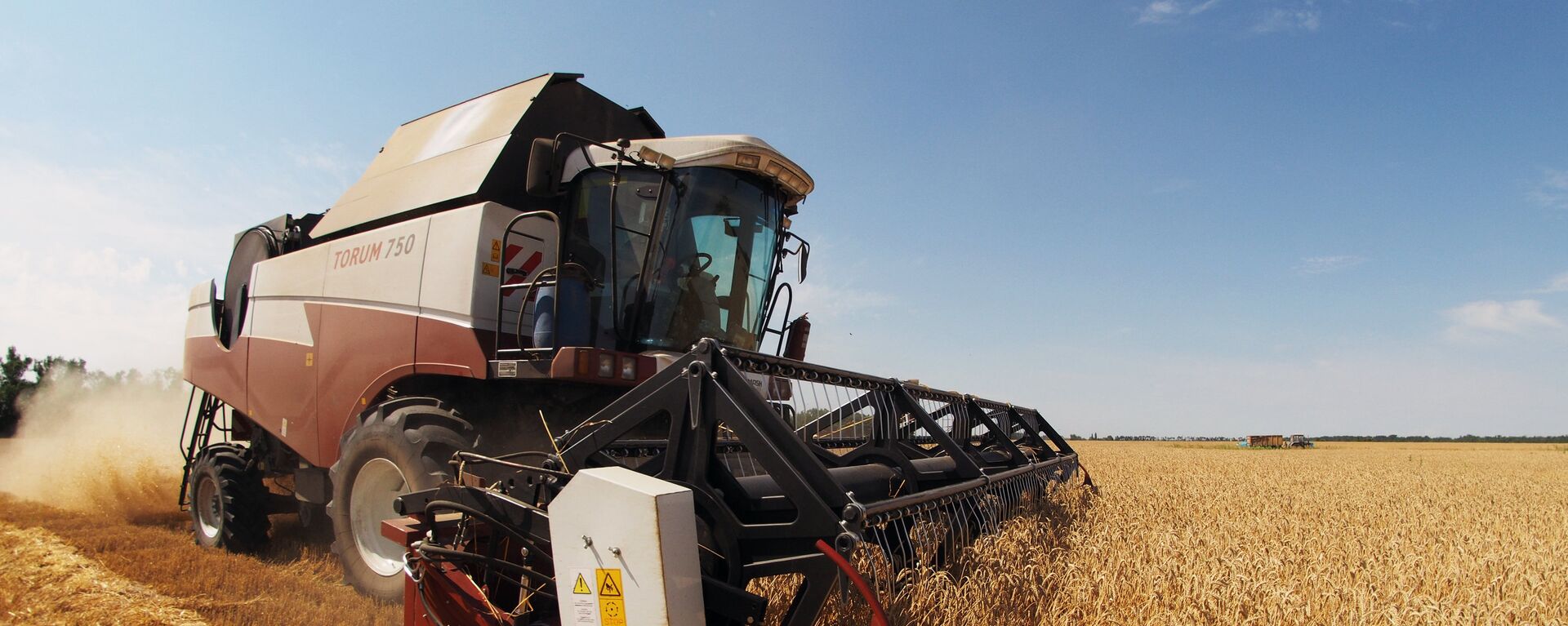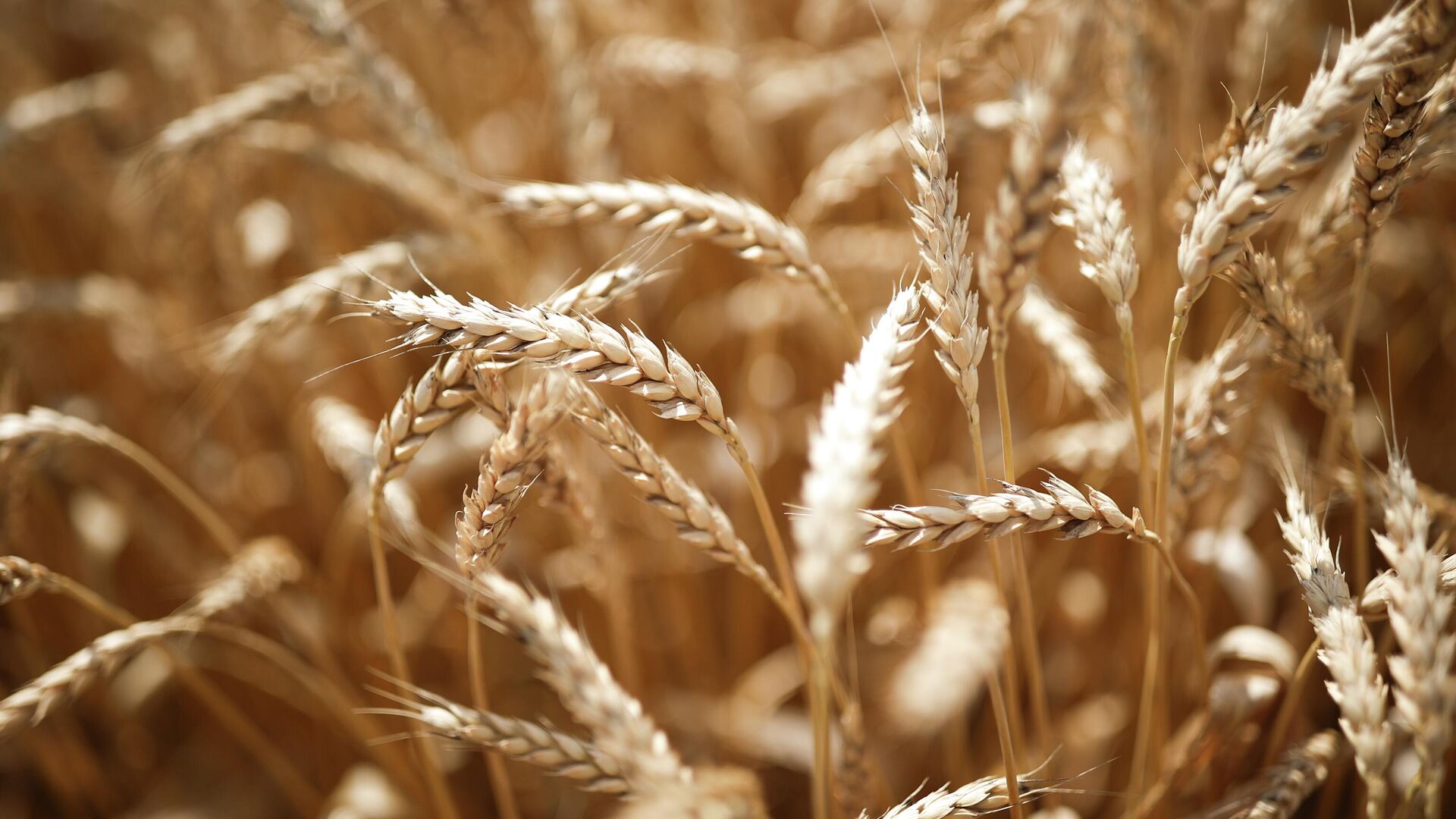https://sputnikglobe.com/20240107/time-is-ripe-for-dollar-free-grain-trade-within-brics-1116027452.html
Time is Ripe for Dollar-Free Grain Trade Within BRICS
Time is Ripe for Dollar-Free Grain Trade Within BRICS
Sputnik International
Expanded BRICS, a club of major developing economies, could become a platform for a self-sufficient dollar-free grain market, economists say.
2024-01-07T08:44+0000
2024-01-07T08:44+0000
2024-01-07T08:44+0000
business
russia
brazil
saudi arabia
brics
european union (eu)
opinion
grain
food security
global food security
https://cdn1.img.sputnikglobe.com/img/07e7/08/07/1112446599_0:160:3072:1888_1920x0_80_0_0_2a4ef1e8d03d10483363af7fb836c752.jpg
BRICS – an acronym for Brazil, Russia, India, China, and South Africa – added net grain importers Egypt, Ethiopia, Iran, Saudi Arabia, and the United Arab Emirates (UAE) in 2024, almost equalizing the production and consumption of key grain crops within the group.Under these circumstances, the association may create its own trading platform and trade grain within the group without using the US dollar, reads a letter from the Russian Union of Grain Exporters (Rusgrain Union) to the Ministry of Agriculture, reviewed by Russian business newspaper Vedomosti.BRICS countries represent a huge part, and in some cases more than half of the market for these agricultural goods, the expert pointed out. "In short, this fruit is ripe to be picked up," Petrichenko stressed.BRICS' Grain ExchangeIn the letter to the ministry, Rusgrain Union Chairman Eduard Zernin, argued that these developments create the preconditions for the formation of a BRICS "grain exchange." He believes that Russia could play "the role of a supplier of last resort," to which "other net exporters may later join.""We have serious prerequisites for creating our own trading platform with settlements in any of the currencies of the BRICS countries, and in the future – in a special clearing currency in Russia or one of the countries with a strong financial system and a freely convertible currency other than the dollar," argued Zernin.The government initiative to create a group grain exchange wouldn't be enough: what is also needed is the commercial participation of operators of the grain and oilseed markets, according to Petrichenko.Having abandoned the US dollar, the group would need to pick a proper clearing currency, the expert continued."Another key point is the clearing part. That is, what the clearing center will be like, where it will be, and most importantly, in what currency the settlements will be made," Petrichenko said.Will West Throw Sand in BRICS' Gears?Per Petrichenko, there will be very strong resistance to this process from the countries designated by Russia as "unfriendly" in the wake of the sanctions spree over Moscow's special military operation in Ukraine. Major Western countries and their satellites have tried to paralyze Russia's energy and grain trade in a bid to make the nation's economy scream. However, this trick has not worked.He expects that the process of a "redistribution of markets" won't be an easy one. Still, the US and the EU are likely to see their global share substantially diminished in the future, as per Petrichenko.
https://sputnikglobe.com/20231201/ship-carrying-russian-humanitarian-grain-arrives-in-africa-1115325231.html
https://sputnikglobe.com/20240105/one-in-three-un-countries-are-opting-for-de-dollarization-1115987761.html
https://sputnikglobe.com/20231027/russia-to-be-able-to-export-65mln-tonnes-of-grain-in-2023-2024-1114528797.html
russia
brazil
saudi arabia
uae
egypt
Sputnik International
feedback@sputniknews.com
+74956456601
MIA „Rossiya Segodnya“
2024
News
en_EN
Sputnik International
feedback@sputniknews.com
+74956456601
MIA „Rossiya Segodnya“
Sputnik International
feedback@sputniknews.com
+74956456601
MIA „Rossiya Segodnya“
brics, brics expansion, grain trade, russia's grain trade, grain trade within brics, brics members export grain, brics consumption of grain, grain exchange, redistribution of grain market, anti-russia sanctions, global south, russia increasing grain deliveries to global south, food security, brics' grain exchange, dollar-free grain trade within brics
brics, brics expansion, grain trade, russia's grain trade, grain trade within brics, brics members export grain, brics consumption of grain, grain exchange, redistribution of grain market, anti-russia sanctions, global south, russia increasing grain deliveries to global south, food security, brics' grain exchange, dollar-free grain trade within brics
Time is Ripe for Dollar-Free Grain Trade Within BRICS
Expanded BRICS, a club of major developing economies, could become a platform for a self-sufficient dollar-free grain market, economists say.
BRICS – an acronym for Brazil, Russia, India, China, and
South Africa – added net grain importers Egypt, Ethiopia, Iran, Saudi Arabia, and the United Arab Emirates (UAE) in 2024, almost equalizing the production and consumption of key grain crops within the group.
Under these circumstances, the association may create its own trading platform and trade grain within the group without using the US dollar, reads a letter from the Russian Union of Grain Exporters (Rusgrain Union) to the Ministry of Agriculture, reviewed by Russian business newspaper Vedomosti.
According to Rusgrain Union estimates, the five BRICS countries at the end of 2023 produced a total of 1.17 billion tons of grain per year (42% of world production) and consumed 1.1 billion tons (40% of world consumption). After the expansion, the group's grain production will mount to 1.23 billion tons per year (44% of the world), and consumption will come close to production, i.e. 1.22 billion tons (also 44%).
"Statistically, it is true that 25% of the wheat trade is Russian wheat," Vladimir Petrichenko, CEO of the analytical company ProZerno, told Sputnik. "Likewise, more than 25% of the corn trade is Brazilian corn. Moreover, if we talk about soybeans, then about 58% of world trade is Brazilian soybeans. At the same time, China is the largest buyer of corn and wheat, Egypt is the largest buyer of wheat, although to a lesser extent; but they buy wheat in the same way as China there, 12 million tons per year. Now Saudi Arabia has been added, the main buyer of barley. But still, the key commodities are wheat, corn and soybeans. And for all of them, especially considering those who joined in January, this is a huge market."
BRICS countries represent
a huge part, and in some cases more than half of the market for these agricultural goods, the expert pointed out. "In short, this fruit is ripe to be picked up," Petrichenko stressed.

1 December 2023, 11:51 GMT
In the letter to the ministry, Rusgrain Union Chairman Eduard Zernin, argued that these developments create the preconditions for the formation of a BRICS "grain exchange." He believes that Russia could play "the role of a supplier of last resort," to which "other net exporters may later join."
"We have serious prerequisites for creating our own trading platform with settlements in any of the currencies of the BRICS countries, and in the future – in a special clearing currency in Russia or one of the countries with a strong financial system and a freely convertible currency other than the dollar," argued Zernin.
The government initiative to create a group grain exchange wouldn't be enough: what is also needed is the commercial participation of operators of the grain and oilseed markets, according to Petrichenko.
"The creation of an exchange is in many ways not entirely a government matter. That is, it is created by commercial operators. So there must be joint work between state and non-state operators. If we look at the Chinese Dalian exchange, its influence on pricing in the markets is insignificant, although the turnover there is very large," the expert explained, expressing optimism over the endeavor's prospects.
Having abandoned the US dollar, the group would need to pick a proper clearing currency, the expert continued.
"Another key point is the clearing part. That is, what the clearing center will be like, where it will be, and most importantly, in what currency the settlements will be made," Petrichenko said.

5 January 2024, 12:11 GMT
Will West Throw Sand in BRICS' Gears?
Per Petrichenko, there will be very strong
resistance to this process from the countries designated by Russia as "unfriendly" in the wake of the sanctions spree over Moscow's special military operation in Ukraine. Major Western countries and their satellites have tried to paralyze Russia's energy and grain trade in a bid to make the nation's economy scream. However, this trick
has not worked.
"[Russia] has already considerably displaced the US and EU in the wheat market," the expert noted. "Brazil has greatly pushed the US in the corn market. At least now Brazil exports more corn than the United States. And in the soybean market, Brazil has long been number one. Therefore, there will be very strong resistance and sabotage on the part of the unfriendly outgoing exporters."
He expects that the process of a "redistribution of markets" won't be an easy one. Still, the US and the EU are likely to see their global share substantially diminished in the future, as per Petrichenko.
"Right now it appears to be hard to imagine that, given that the key operators in these markets are transnational companies that have their headquarters in the US and the EU. That is, whatever one may say, there are main players in this market – transnational companies. They represent an 'unfriendly contingent' for BRICS and especially Russia," the expert concluded.

27 October 2023, 13:47 GMT





